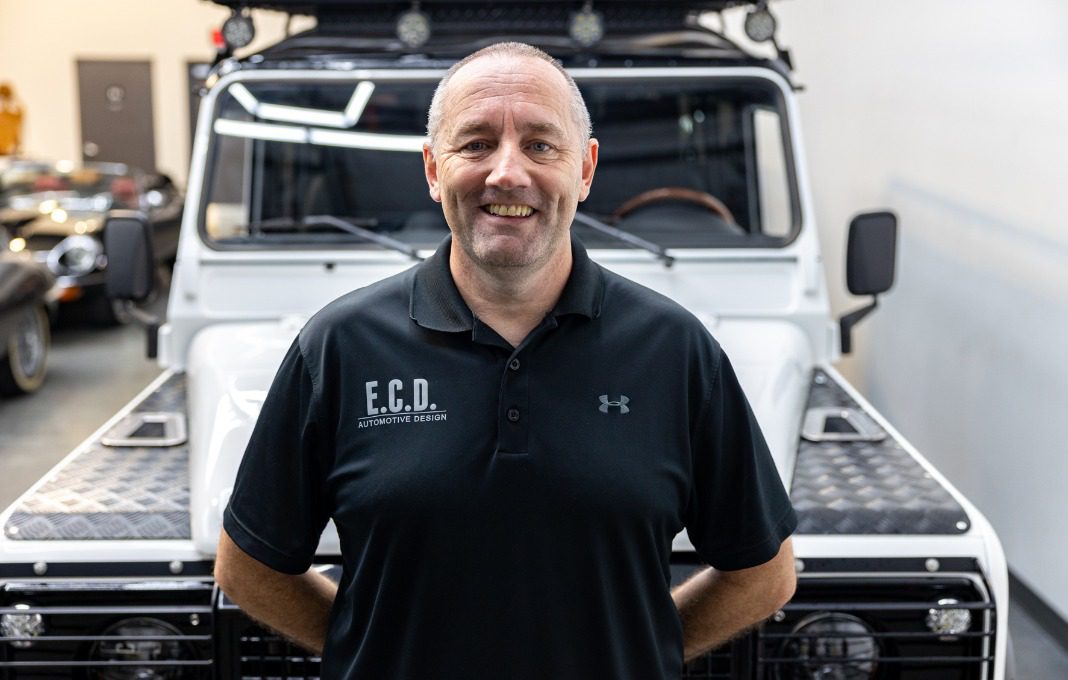It’s like a Jay Leno pipe dream: 100,000 square feet of automotive restoration in a manufacturing plant that treats each vehicle with finicky customization worthy of a place in the former talk-show host’s voluminous California garage.
That’s what Scott Wallace has accomplished at his ECD Auto plant in Orlando, where his 73 technicians already have restored more than 600 original Land Rover Defenders over the last 10 years, expanded their retinue to include refurbishment of Ford Mustangs and other vintage models, launched an IPO and eased ECD on its way to $65 million in revenues once its factory gets up to full production.
There are hundreds if not thousands of smaller auto-restoration shops around the United States, but Wallace tells Chief Executive about the uniqueness of ECD’s factory-based business model.
“This industry is full of really good mom-and-pop businesses that are really good at restoring but are a fundamental failure,” he says. “They’re all run by mechanics. I’m the worst ‘mechanic’ at ECD. What the industry has missed is to scale it and optimize it, build a business. To apply common business sense: scale, efficiencies, culture and how to build a factory.”
ECD’s clients for a typical restored Defender, the original English utility vehicle, pay around $300,000 or so after selecting from among thousands of potential choices in an extreme customization plan executed by the company’s experienced automotive mechanics and restorers.
“We do everything in house,” Wallace says. “Nothing is subcontracted, and that’s a rare thing. Otherwise, you lose timing control and quality control.”
Clients tend to be CEOs, celebrities, professional athletes and other high-net-worth individuals. “Something strange about ECD is we don’t have to act like a luxury brand,” Wallace says. “Clients quite like the fact that it’s a factory full of automotive geeks and misfits. They get lost in it. They’re famous names, but they seem to chill in the process.”
To that end, he says, ECD puts “mechanics at the center of the experience. We don’t let them fix bad things; they make cool things. Retention of our mechanics is 95 percent, double the national average.”
One way ECD encourages mechanics to stick around, Wallace explains, is to “create an autonomy culture. I don’t build the car; they don’t own the business, but cars have to be built to the highest quality and on time. We run production and make it work.
“If you’ve got a blockage in the drive-train area and the electricians need to get in, the drive train people will work it up the line. But there’s no supervisor butting in. We really embrace an autonomous culture where the technicians in the business are treated far more importantly than the C-Suite.”
ECD’s process starts by obtaining units of the original British farm vehicle, which Wallace calls “the F-150 of Britain, a workhorse. There were two million of them made until Jaguar Land Rover stopped producing the original in 2016, so there’s never going to be a shortage.”
ECD pays an average price of $15,000 for one of the vehicles, which it sources from farmers, U.K. government agencies, utilities and other places. It gets them to the U.S., where it works with clients through a video-game-like customization app that gives customers design control over the vehicle as to how it’s going to be restored.
The company also restores Jaguar e-types and is adding Ford Mustang and Toyota FJ restoration to its offerings.
“We wanted to take the white-glove mindset and move it to the automotive business,” says Wallace, a former private-equity player in Europe. “And customers love the romance, the history and the nostalgia of it all.”
To that end, Wallace notes, ECD will go far to deliver bespoke results for its clients while taking advantage of the efficiencies of a restoration factory. “We had one who wanted leather in the car from a particular herd of cattle in Italy,” Wallace says. “We had to source it, from the farmer to the slaughterhouse. The car has just that leather.”
ECD also plans to open the company’s first retail locations, in South Florida. “To get to where we want to be, we need a retail presence,” Wallace says. “If Ferrari closed all its retail stores, the brand would slump. But if we open retail stores, then our sales should scale. We want to maintain the mindset of disrupting the automotive business.
“We don’t want our stores to be anything like current dealerships, even luxury ones,” he adds, suggesting that Seattle and New York City would be future targets for ECD stores. “They will be membership-based. We will hold events there. We can offer storage for classic cars. No one has been able to buy our cars to feel them and test drive them. For the first time, people can come and see and touch and drive.”








